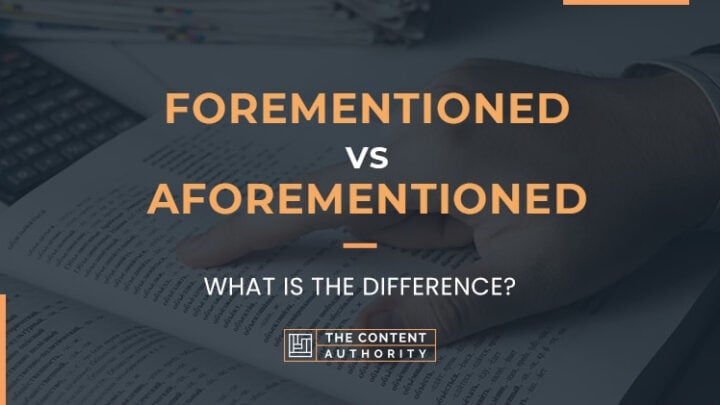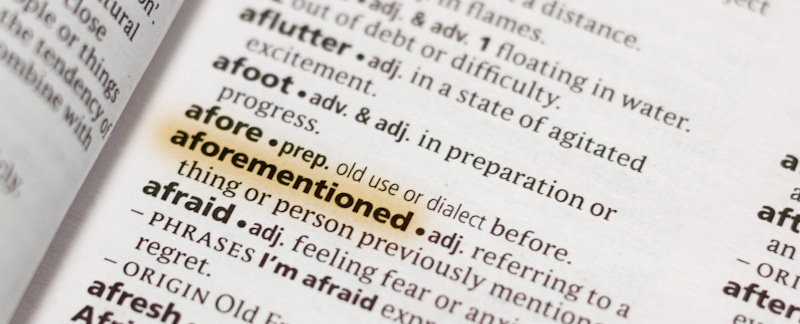These two very similar words sound and look very similar, but have you ever wondered which one is the correct one to use and under which circumstances? Are they referring to the same thing? Are they adjectives or nouns? In this article, we will break down these words; additionally, we will discuss their uses and differences depending on their context.
As adjectives, these words are interchangeable. Both serve to make reference to a person, object, or place that has previously been mentioned within the context of what is being said or written. They are employed to refer and advance evidence to a noun that was brought up in the recent past.
When Was This Word First Used?
The origin of the phrase ”aforementioned” as an adjective can be traced back to the 1580s to imply a past participle of ”mention”. Similar words such as ”aforewritten” and ”aforenamed” were first used in the mid-15th century and the year 1600, respectively.
So in the general sense, these words mean the same, and there is no real wrong way to replace one with the other. For example, suppose we were in a court of law. In that case, we could speak of the forementioned list of witnesses or the aforementioned batch of evidence, and these adjectives could be used interchangeably in any order.
Are There Synonyms For These Words?
Synonyms to these adjectives include ”forecited”, ”aforesaid”, ”forenamed”, and ”abovementioned”. Furthermore, they all indicate something or someone that was already cited or recently mentioned. On the other hand, its antonyms would be ”undermentioned” and ”following,” and they are used to allude to things that are yet to be mentioned or will be noted later.
When we use ”aforementioned” in a sentence, we must usually include articles such as ”the.” This combination results in the word becoming more than a simple adjective but a determiner, which is a word that takes place before a noun to specify quantity, specificity, and ownership. For example,
- Many cats
- That cat
- My cat
- A cat
For the phrase to work, we must include the appropriate article that would convert it into a demonstrative determiner (that, this, these, those)
Are These Words Only Adjectives?
Now, did you know that ”aforementioned” can also be a noun? Based on how recently the things being discussed have been referred to, it can be used as a noun. For example, say we’re inside a courtroom. Instead of witnesses, there is a list of suspects. The bailiff would then proceed to read a list and say: ”All of the aforementioned should rise and face the jury.”
In this scenario, the phrase is no longer an adjective but a noun as it is not accompanied by any other nouns such as ”suspects” or ”gentlemen”. We can do this by using ”aforementioned” as a time-stamped short-term shortcut to something being very recently cited, and we can avoid using a noun to specify further by using the phrase as a noun in itself.
What Are Their Differences In Application?
This application would not be possible when using ”forementioned” in the sentence, and this is due to the only changing factors on these words: fore and afore. Fore is still a word, and it is used as a noun to mean the leading part of something such as a foreground. For example, in a sentence, it would be:
- ”The fore was painted black.” Meaning the front or forward part of something was painted black.
It can be used as an interjection or exclamation within the context of golf, for instance, when it is yelled to notify people or players that a ball is heading in their general direction. You have probably heard – fore! being yelled at you or someone else, even if you have never played golf a day in your life.
Lastly, it is also used as a verb to replace the phrase fare, for example: ”I fare you well” and ”I fore you well.” Both are acceptable grammatically and are very tongue-in-cheek ways to say ”I fare thee well”. There is a chance we will not sound too Shakespearean this way, though not by much.
Now, you may notice that the forementioned paragraph did not include adjectives or adverbs as part of its repertoire. This is why we cannot get away with using it the same way as aforementioned. Fore is no longer considered an adverb and, subsequently, has become obsolete and unable to infer something that occurred earlier.
Contrastingly, we can still use afore as a preposition, conjunction, and, most importantly, an adverb. It is still considered a dialect for the word before, and this differentiates it from its interchangeable partner. This is how our dear bailiff can pull off stating just the aforementioned without clarifying the subject being cited.
As both a preposition and a conjunction, we can use “afore” the same way we would use before. For example:
- We shall meet the winter afore next year to gather berries on the meadow.
This sentence executes the phrase ”afore” as a dialect to ”before”. Of course, this vernacular is closer to what was being said around the 1890s than it is to our current use nowadays, in the 21st century, but it still carries its intended meaning, and one can still use it only, risking sounding antiquated.

Can We Use These Words In Regular Conversation?
These words are very rarely used in conversation anymore, and that is a sign of the times. However, they are still on heavy rotation at the time of redacting important documents, particularly the legal kind or formal correspondence between parties.
Some people think that unless what you are writing is of a legal nature or you are, somehow, in correspondence with the Queen of England, then you can abstain from using it. They would consider the frequent use of the word a reach into the distant past and deem it too old to survive the rigors of modern colloquial speech. It is so formal and archaic that some versions of Microsoft Word will try to correct you out of using it depending on the context, for example, a job application where you use the word to make reference to a previously stated skill or experience.
However, there aren’t any actual grammatical restrictions, for it is not frowned upon to use it. There are no rules that narrow down its uses to just formal or legal contexts; even though social convention has dictated, this is where they would shine the most. It is, in the end, a matter of personal opinion.
For example, if I just saw a car, chances are I will tell my neighbor:
- I just saw a car before, and it was a Mustang.
Instead of choosing to say:
- I saw a car this morning. The aforementioned was a Mustang.
There are no mistakes in either of these iterations of the sentence, but you can see how one of them may pass for an attempt to be overly official or formal.
Conclusion
Even if we were to be a lawyer in the highest court of law, we would have a problem getting away with using the word out loud in front of the average listener. Now, under these same circumstances, if we were to write it as part of a case that we were working on, then all of our peers, including the judge, would both allow it and even expect to see it within the manifest we were producing for the court. This is because it fits swiftly within the legal jargon used in court proceedings.
So, we dare you to try using it in a sentence today and read the reactions it gets from your listeners. Chances are that unless you are standing in front of avid Shakespeare readers or time-tested legal practitioners, you will get a quizzical stare back from all of those in attendance.
Shawn Manaher is the founder and CEO of The Content Authority. He’s one part content manager, one part writing ninja organizer, and two parts leader of top content creators. You don’t even want to know what he calls pancakes.


